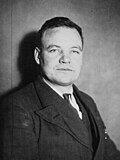| |||||||||||||||||||||||||||||||||||||||||||||
All 607 seats to the Chamber of Deputies | |||||||||||||||||||||||||||||||||||||||||||||
|---|---|---|---|---|---|---|---|---|---|---|---|---|---|---|---|---|---|---|---|---|---|---|---|---|---|---|---|---|---|---|---|---|---|---|---|---|---|---|---|---|---|---|---|---|---|
| Registered | 11,740,893 | ||||||||||||||||||||||||||||||||||||||||||||
| Turnout | 9,576,422 (81.6%) | ||||||||||||||||||||||||||||||||||||||||||||
| |||||||||||||||||||||||||||||||||||||||||||||
| |||||||||||||||||||||||||||||||||||||||||||||
| This article is part of a series on |
 |
|---|
Legislative elections were held in France on 1 and 8 May 1932 to elect the 15th legislature of the French Third Republic.
Contents
The elections saw the victory of the second Cartel des gauches , but the socialists and Radicals could not form a coalition government. Édouard Herriot instead formed a government with the support of the centre-right and Radicals held the premiership until the 6 February 1934 crisis.



